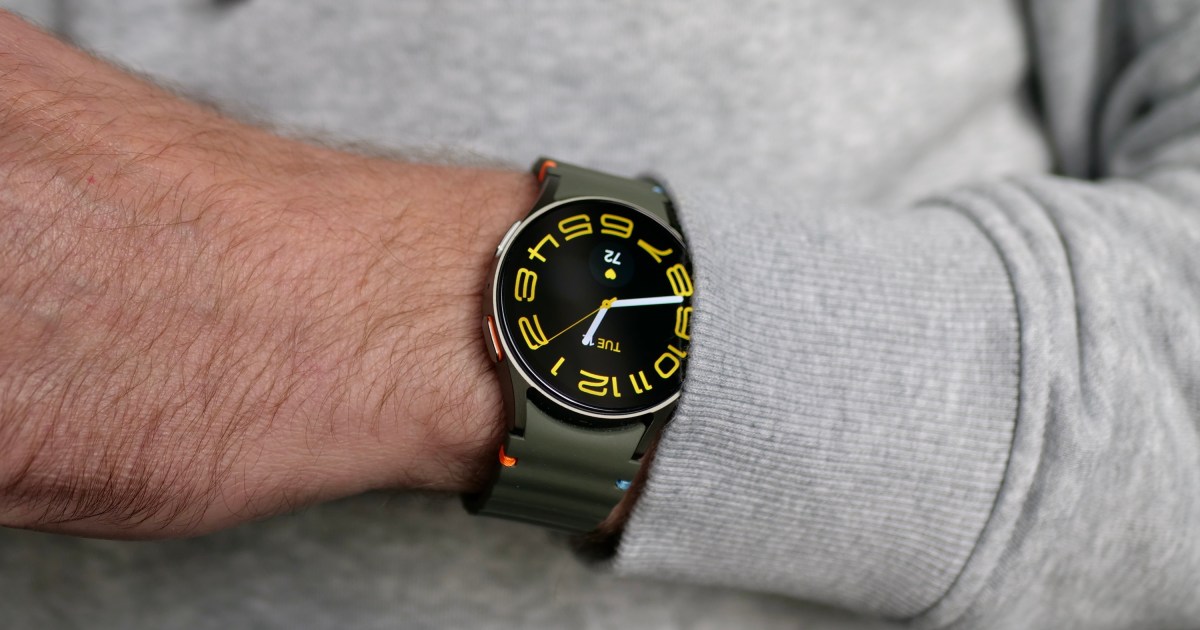I like large watches and the way they look on my wrist. Even outside of traditional watches, I gravitate towards the biggest size of smartwatch available. When I reviewed the Samsung Galaxy Watch 7, I wore the 44mm size and quite liked it. However, when I had the chance to try out the 40mm version, I decided it was a good opportunity to see if bigger was always better.
It turns out that for the Galaxy Watch 7, it’s not.
Is there really a difference?
Four whole millimeters doesn’t sound like much, but it’s genuinely noticeable when you put the 40mm Galaxy Watch 7 next to the 44mm version. The 40mm model looks daintier and arguably better proportioned, as the case doesn’t extend that far outside the natural curved line of the strap, unlike with the 44m one. The watch’s proportions are just right, and it doesn’t suffer from looking too diminutive, like the Google Pixel Watch and Pixel Watch 2.
There’s a tiny difference in weight, too, with the 40mm smartwatch weighing 51 grams with the rubber strap and the 44mm version with the same type of strap weighing 57 grams. Together, these small alterations in size and weight contribute to making the 40mm Galaxy Watch 7 less noticeable on your wrist and, in turn, less awkward to wear under a cuff or overnight.
- 1.
40mm Samsung Galaxy Watch 7 - 2.
44mm Samsung Galaxy Watch 7
The standard rubber strap that comes with the Galaxy Watch 7 looks great, appears to be very durable, and has plenty of adjustment, too. If you buy the 40mm Galaxy Watch 7, it comes with a slightly shorter strap than the 44mm version. It has the same number of holes, so there’s the same degree of adjustment, but the “tail” is about an inch shorter. It may not sound like a big thing, but it makes more of a difference than you may expect.
Better for comfort

The assumption is that people with big wrists will want the larger watch case size, and therefore a longer strap, but what’s more interesting is what works best for those of us with smaller wrists. When I wear the 44mm version on my 6.5-inch wrist, I do it up on the third-from-tightest hole, and the strap’s design means the lengthy remainder is tucked underneath the clasp and against my skin. I found it could get quite hot this way, and because Samsung doesn’t give you a choice of strap lengths in the box, I had to live with it.
The shorter length strap with the 40mm Galaxy Watch 7 solves this problem, and it is just about the perfect fit on my wrist. I secure it with six holes remaining on the strap and only a tiny bit tucked under the clasp, and it entirely removes the feeling of thickness and heft I got with the longer strap fitted to the 44mm version. The straps are interchangeable, so if you want the larger watch case size, but still have a relatively small wrist, it may be worth getting a second, shorter-length strap, too. I have found it considerably more comfortable, especially when wearing it overnight.

If you’re keen to track your sleep, the 40mm Galaxy Watch 7 is a good companion. The Samsung Health app provides an overall Sleep Score, along with data including the time spent asleep, sleep stages, recovery estimates, blood oxygen levels, skin temperature, heart rate, and respiratory rate. If you give the app permission, it’ll provide snore detection, too. I compared the Galaxy Watch 7’s results to those of the Oura Ring 4, and both agreed on average heart rate, respiratory rate, and blood oxygen, but differed quite a lot in sleep stages and time asleep, resulting in quite different Sleep Scores.
Wearing it all the time introduces a problem

The Oura Ring 4’s overview of my sleep was closer to how I felt than that of the Galaxy Watch 7, but if I only had Samsung’s Health data to go on, it wouldn’t change my daily routine or cause concern. Additionally, the Oura Ring knows my body and baselines better than the Galaxy Watch 7, so over time, the two may get closer together. Perhaps more importantly, I’m happier wearing the 40mm Galaxy Watch 7 to track sleep than I was with the 44mm watch.
However, while I can more comfortably wear the 40mm Galaxy Watch when I sleep and also appreciate its automatic workout tracking feature — which accurately picked up a couple of workouts I deliberately didn’t manually track — using the smartwatch consistently exposes its less than-ideal battery life.

Short battery life is a problem with the 44mm Galaxy Watch 7, and it’s perhaps even more disappointing with the 40mm model. One night’s sleep and a full day with a single workout tracked is all you’re going to get from a charge. If you don’t track a workout, it’s still unlikely you’ll get a full second night’s sleep tracking in, especially if you’ve used apps and navigation or had a lot of notifications during the day.
Battery life can’t spoil the 40mm Galaxy Watch 7

The short battery life means you have to pay close attention to what you do with the smartwatch and make a charging plan if you want to wear and use it all the time. I’ve spent plenty of time with the Apple Watch Series 10 recently, and the battery life is significantly longer and also far more predictable. It’s unfortunate, as the battery can put you off wearing the Galaxy Watch 7 or even buying it in the first place.
I’ve had the Galaxy Watch 7 connected to a non-Samsung phone and haven’t noticed any significant feature changes or lack of functionality. It has tracked everything I want, delivered notifications, and even worked to take an incoming call on my wrist, which was very helpful at the time. However, being mindful of the battery does take the sheen off the Galaxy Watch 7 despite its many positives.
Revisiting the Galaxy Watch 7 with its smaller size has made me think differently about which one I’d choose to wear long-term. While my default position is to always go with the larger size, in this case, the 40mm model has turned out to be more wearable and more comfortable, and it’s definitely the better choice for me. It probably won’t dramatically change the way I look at other watches in the future, but it’ll teach me to experiment more. If you’re considering which one to buy, don’t dismiss the 40mm version as too small, as it may turn out to be ideal.
Read the full article here
















